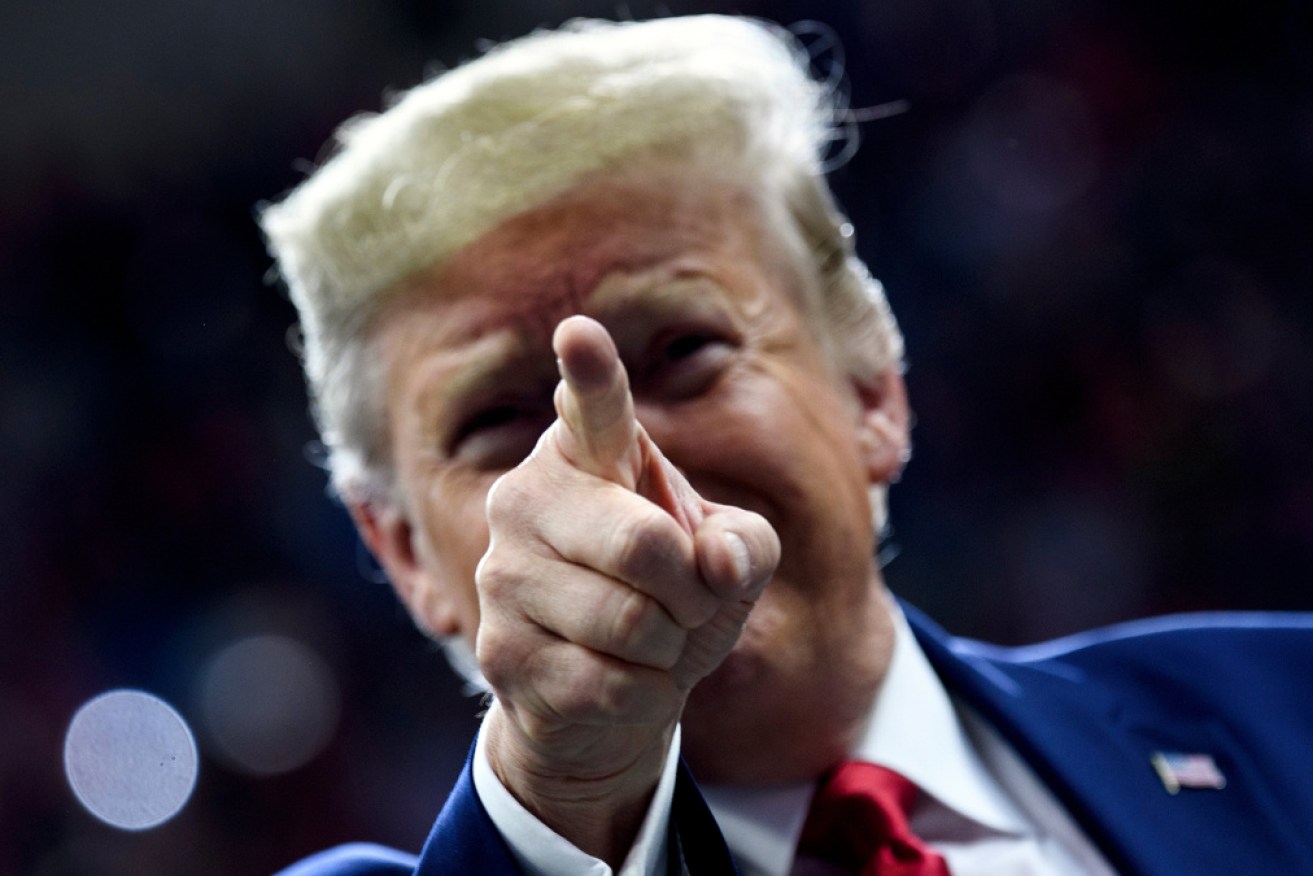Impeachment: Witnesses made it a bad week for Trump, a very bad week

Trump's impeachment saga has taught us lessons. But it's also left us with questions. Photo: Getty
With the last of the scheduled public impeachment hearings coming to a close, three things are now clear:
- The Trump administration did seek a ‘quid pro quo’ from Ukraine.
- The diplomats and staffers involved are trying to save themselves.
- US President Donald Trump and his personal lawyer Rudy Giuliani are at the centre of the scheme.
But three key questions remain unanswered.
- Was any of this an impeachable offence?
- Did the hearings change the minds of voters?
- And will the final outcome advantage Democrats or Republicans?
The hearings form a cohesive narrative
The 12 witnesses who testified before cameras have corroborated, in detail, each other’s evidence. That evidence is based on conversations, meetings, text messages and emails between those who were doing the negotiating over several months.
Mr Trump wanted Ukraine to investigate the business dealings of Democrat Joe Biden’s son, Hunter, who was once a board member of the Ukrainian gas company Burisma.
(Such an investigation would likely damage Mr Biden’s chances of winning the Democratic presidential nomination and the 2020 election.)
Mr Trump also wanted Ukraine to investigate a discredited conspiracy theory that Ukraine worked with Democrats to plant evidence on the Democratic National Committee server in 2016 to implicate Russia in election meddling, helping trigger the Mueller probe.
Mr Giuliani was deployed by the President as the point man to get these investigations to happen.
VOLKER re: July 25 call: "I don't think that raising 2016 elections or vice president Biden or these things that I consider to be conspiracy theories that are ciruclated by Ukrainians … they're not things that we should be pursuing."
— Kyle Cheney (@kyledcheney) November 19, 2019
Ambassador Sondland: "President Trump directed us to “talk with Rudy.” We understood that “talk with Rudy” meant talk with Mr. Rudy Giuliani, the President’s personal lawyer. Let me say again: We weren’t happy with the President’s directive to talk with Rudy." pic.twitter.com/Cmbc45iYnW
— CSPAN (@cspan) November 20, 2019
US diplomats and national security staff were unhappy about having to work with Mr Giuliani, but they did it anyway “at the express direction of the President of the United States”.
“We did not want to work with Mr Giuliani. Simply put, we were playing the hand we were dealt,” US ambassador to the EU Gordon Sondland said.
“We followed the President’s orders.”
Wow.
HILL on why Sondland didn't coordinate with the professional staff, like her:
"… because he was being involved with a domestic political errand. And we were being involved in (foreign policy)."
— Lisa Desjardins (@LisaDNews) November 21, 2019
This big statement came from a political appointee who paid $US1 million for a VIP ticket to Mr Trump’s inauguration. But he didn’t stop there.
“I know that members of this committee have frequently framed these complicated issues in the form of a simple question: Was there a ‘quid pro quo?'” Mr Sondland said in his opening statement before the questioning began.
“With regard to the requested White House call and White House meeting, the answer is yes.”
Three things were at stake in the ‘quid pro quo’
- A phone call between the American and Ukrainian presidents
- A White House summit between the pair
- US military aid to Ukraine to support its fight against Russian-backed rebels
All three were used as bargaining chips while negotiations went on behind the scenes to try to get the newly elected Ukrainian President, Volodymir Zelenskiy, who was in need of credibility, to publicly announce the investigations.
Vice-President Mike Pence, Secretary of State Mike Pompeo, Energy Secretary Rick Perry, Mr Sondland, US Special Rep for Ukraine ambassador Kurt Volker, acting Ukraine ambassador Bill Taylor, National Security Council Europe reps Tim Morrison and Lt Col Alexander Vindman and others are all said to have been in the loop, albeit at different stages.
“A lot of senior officials … a lot of senior officials … everyone was in the loop. It was no secret,” Mr Sondland said.
The Vice-President’s office has pushed back hard on the allegations.
NEW: Pence chief of staff pushes back, says VP Pence *never* had a conversation with Sondland about investigations into Bidens, Burisma or conditional release of military aid. pic.twitter.com/28FL905CpB
— Peter Alexander (@PeterAlexander) November 20, 2019
The President homed in on a conversation with Mr Sondland that the Ambassador recounted in his deposition. Mr Trump read it out loud to the White House press corps.
“‘I want nothing, that’s what I want from Ukraine,’ that’s what I said. I want nothing. I said it twice. I want no quid pro quo. Tell Zelenskiy to do the right thing.”
Pres. Trump holds notes while speaking to the media on the White House lawn amid Amb. Gordon Sondland's testimony. https://t.co/dxWcis0cgF #ImpeachmentHearings pic.twitter.com/3tylThUUMz
— ABC News (@ABC) November 20, 2019
Sondland didn’t really buy it
However, Mr Sondland says that in spite of that exchange, he “came to believe” that the continuing suspension of military aid to Ukraine was linked to the Trump administration’s push for politically motivated investigations.
Mr Sondland also says he has evidence in the form of text messages showing that the White House phone call and meeting were being used as an incentive for the Ukrainian President.
“I was presuming on the aid,” he said, but not the other things.
Republicans seized on his presumption.
This pretty much sums up the entire Republican defense right now. https://t.co/fxgdy8e9pD
— Jon Favreau (@jonfavs) November 21, 2019
Mr Sondland’s testimony heavily implicates Mr Pompeo, who has denied involvement in the Ukraine affairs. In an email to Mr Pompeo on August 22, Mr Sondland wrote:
“I would ask Zelenskiy to look [Mr Trump] in the eye and tell him that once Ukraine’s new justice folks are in place mid-Sept, that [Mr Zelenskiy] should be able to move forward publicly and with confidence on those issues of importance to POTUS and to the US.”
“Hopefully, that will break the logjam” on funding.
The ambassador also said he was directed by the State Department and the White House not to testify and access to phone and email records was blocked, raising an obstruction of justice question.
Is this all just the work of Never Trumpers, seeking revenge?
Mr Sondland’s testimony was the most explosive so far in a group that Mr Trump has sought to characterise as “Never Trumpers”. They’re plainly not.
All those who have testified publicly have had distinguished careers in public service under various administrations.
Jennifer Williams, a veteran foreign service officer and special adviser on Europe and Russia to Mr Pence, was asked in the hearings if she’d describe herself as a “Never Trumper”.
“I would not, no,” she replied.
Tell Jennifer Williams, whoever that is, to read BOTH transcripts of the presidential calls, & see the just released ststement from Ukraine. Then she should meet with the other Never Trumpers, who I don’t know & mostly never even heard of, & work out a better presidential attack!
— Donald J. Trump (@realDonaldTrump) November 17, 2019
“Tell Jennifer Williams, whoever that is, to read BOTH transcripts of the presidential calls, & see the just released statement from Ukraine. Then she should meet with the other Never Trumpers, who I don’t know & mostly never even heard of, & work out a better presidential attack!” Mr Trump tweeted ahead of her testimony.
Ms Williams was one of the few national security officials who listened and took extensive notes during the July 25 telephone call between Mr Trump and the Ukraine President.
She said that the conversation was “more political in nature” than other calls with foreign leaders and that she felt it was “unusual and inappropriate”.
Then there was Lt Col Vindman
“I would call myself never partisan,” he replied, when he was asked if he was a Never Trumper.
Lt Col Vindman, who was born in Ukraine and came to the United States as a young child, was on the receiving end of some toxic attacks over his decision to report the call to his supervisor and testify.
Still upset about attempts today to smear Vindman because of his heritage and ethnicity. And just to be clear, Vindmans family fled the Soviet Union, not Ukraine. And for those that feel the need to use hyphenated adjectives, he is Jewish-American not Ukrainian-American.
— Michael McFaul (@McFaul) November 19, 2019
He’s been threatened to the extent that he may need to move his family to a guarded location, and felt the need to reassure his father during his statement.
That's Lt. Col. Vindman @DevinNunes. His closing remarks are moving: pic.twitter.com/iEetzFgE0O
— Brian J. Karem (@BrianKarem) November 19, 2019
NEW Army is ready to relocate Lt. Col Alex Vindman and his family to an Army base to protect him. Stepped up patrols of his home and security assessment come after @realDonaldTrump & GOP allies have attacked impeachment witness.https://t.co/iM0Pa6PPD9
— Carol Leonnig (@CarolLeonnig) November 19, 2019
A purple heart recipient after a tour in Iraq, he was attacked by the President for appearing in uniform at the hearing, which is standard for serving officers.
Trump also mocked Vindman last week for wearing his military uniform to his closed-door testimony (he's an active-duty Army officer), saying in a Dan Bongino interview, "You know him. He shows up in his uniform for the first time ever." https://t.co/H3MpRpxZVG
— Daniel Dale (@ddale8) November 19, 2019
Okay guys can we please stop making this a thing? Active duty service members are literally required to wear their dress uniforms when appearing on Capitol Hill in an official capacity. https://t.co/DWXD9LchoU
— Katie Bo Lillis (@KatieBoLillis) November 19, 2019
And of course, there was Mr Sondland, who was appointed by Mr Trump and says he’s phoned the President at least 20 times.
Daniel Goldman asks if Sondland said to President Trump that President Zelensky "loves your ass."
Ambassador Sondland: "Sounds like something I would say. That's how President Trump and I communicate. A lot of four-letter words. In this case a three-letter." pic.twitter.com/aHx5a5ma01
— CSPAN (@cspan) November 20, 2019
“I don’t know him very well. I have not spoken to him much,” Mr Trump said.
In October, he called him “a really good man and a great American”.
I would love to send Ambassador Sondland, a really good man and great American, to testify, but unfortunately he would be testifying before a totally compromised kangaroo court, where Republican’s rights have been taken away, and true facts are not allowed out for the public….
— Donald J. Trump (@realDonaldTrump) October 8, 2019
It’s clear the parties disagree. It’s unclear what happens next
Republicans made much this week of the fact that Mr Trump asked the Ukrainian President for a “favour”. That was not an order in the military context, they said, and therefore does not fit the criteria for bribery, or any other impeachable offence.
Democrats plainly disagree and will likely move to a House vote on impeachment in the next four weeks.
Today’s crystal ball indicates a House vote will succeed, and a later Senate vote in the new year will likely fail.
Polls show the population continues to be evenly split on impeachment. The hearings, more to the point, appear to be simply entrenching the partisan divide that exists both in Congress and across America.
Seventy per cent of registered voters say they’re paying “very” or “fairly close” attention to the impeachment inquiry.
However, the 2019 attention span is short, and with a definitive outcome unlikely, that attention may swiftly shift to the election in the new year.
For now, from the White House:
Inbox: "Statement from the Press Secretary: Ambassador Sondland Completely Exonerates President Trump of Any Wrongdoing"
— Meridith McGraw (@meridithmcgraw) November 20, 2019








